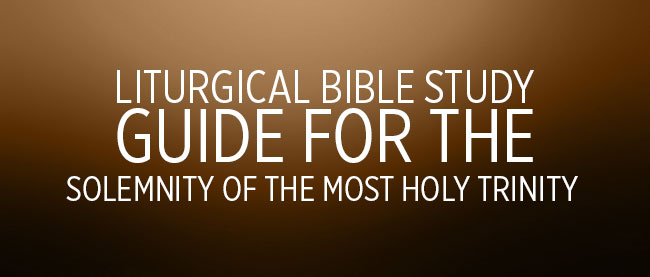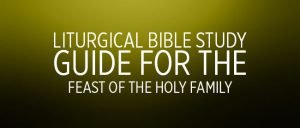Introduction
It would seem that on this particular Sunday the Church would tell us all about the inner workings of the Blessed Trinity. Today would be the prime time for answering such questions as:
- How can one God be three Persons, and three Persons be one God?
- Why three Persons instead of three forces, or three ideas, or three concepts?
- Why only three instead of four, or six or a dozen?
- How does the Trinity work together? Does the Father have veto power?
- How does Jesus’ humanity fit into the Trinity?
- Why didn’t the Father and the Holy Spirit become flesh like the Son and dwell among us?
The doctrine of the Trinity describes the unique ways that we experience God’s presence in our lives. It is a confusing doctrine, even for adults, because it seems to imply three gods who are yet One God. When we speak of the mystery of creator and creation, we can only apprehend that mystery by analogy, poetry, and symbolic language. What we describe with the doctrine of the Trinity is an experience of God.
First, we know God through His creation and through our own creative acts. When we make something, whether it be a piece of furniture or a special meal, we are in touch with God as we shape something into a different form. The intense fulfillment of childbirth is another example of creative time. When we are creative, we feel whole and fulfilled. God is creating through us, and we have a sense of being an instrument for the Divine. We call this way of experiencing God “Father”.
Secondly, we know God in the sense expressed in 1 John 4:16 “God is love, and He who abides in love abides in God, and God abides in him.” God is as close to us as the healing love that is shared among His people. It was Jesus who proclaimed this reality by the power of love He showed in His life, death, and resurrection. Using the metaphors of biblical language, we could say that we “meet Christ” in the acts of love and healing. We know God through the “flesh and blood” of His presence in our lives and through the power of love that leads us into deeper life. We call this way of experiencing and knowing God “Son”, since Jesus is called the Son of God.
Finally, we feel the spirit and are “turned on” to God’s power. We know God through the inspiration that comes to us. Our secular use of the word “spirit” describes very well the experiences of God we feel through spiritedness and inspiration. When I say that certain words “came to me” in a moment of crisis, I feel I am describing the experience of receiving inspiration. As Christians we simply add the word “Holy” to the everyday word “Spirit” to define the spirited way of knowing God in our lives. Thus we can say that we know God as Father, Son, and Holy Spirit.
The dogma of the Trinity has not always been clearly defined. In fact, the word “trinity” does not appear in Holy Scripture (neither does the word “pope”, “purgatory”, or “catholic” for that matter – as our fundamentalist brothers and sisters will be quick to point out). It is not even clear how the doctrine was understood in the time of the apostles. The oldest doctrinal formulation of the Church’s belief in the Trinity is in the Apostle’s Creed, which, in the form of the ancient Roman baptismal symbol, served as the basis of catechumenical instruction and as a baptismal confession of faith since the second century.
In the early Church, Christians began to ponder the mystery of God’s unity and the Trinity and attempted to explain more precisely the relationships among the persons of the Trinity. These efforts led to many errors in the early years, and most of those who tried to describe the relationships ended in heresy. Even the great theologians Tertullian and Origin stumbled into error in their attempts to explain the relationship between the Father and the Son. Arius, around the year A.D. 300, concluded that the Word (logos) of God was created by the Father to be the instrument of all other creation. The Word, or God the Son, was a perfect creature to Arius, but a creature nonetheless. Were this account true, then only the Father would be truly God, and the Son and Holy Spirit would then be divine only through adoption by the Father. In such a case, the Most Holy and Undivided Trinity would become merely a descending hierarchy with the Father extending His grace to the Son and the Holy Spirit, rather than a communion of co-equal and co-eternal persons, who together are the one, true God. Arianism finally died out almost 500 years later at the end of the 7th century. Arianism has been revived in the modern world by the Jehovah’s Witnesses who deny that Jesus is God.
The creed which we call the Nicene Creed originated at the Council of Nicea in AD 325. It was probably introduced into the western liturgy by the regional Council of Toledo in A.D. 589. That text however, was a Latin translation of the Greek original and came to include a small addition which resulted in major theological disputes, namely that the Holy Spirit “proceeds” from the Father and the Son, rather than only from the Father. This matter continues to divide Catholic and Protestant Christians from Eastern Orthodox Christians.
1st Reading -Deuteronomy 4:32-34, 39-40
On the plains of Moab, God charges Moses, now close to death, once more to proclaim the Law which he received though the revelation at Mount Sinai. This proclamation is contained in the fifth and last book of the Pentateuch, which is called in the Greek Septuagint deuteronomion, or second law.
Moses is addressing a new generation of Israelites, survivors of the Baal of Peor incident where the men of Israel had indulged in sexual immorality with Moabite women and had bowed down and sacrificed before their gods (baals). As a result of this incident a plague was unleashed against the Israelites which was stopped only when Phineas, grandson of Aaron, thrust his spear through an Israelite man and his Moabite concubine. Twenty-four thousand died in the plague. It was at this point that the line of the priesthood passed from the Levites to the line of Phineas (Numbers 25:13).
The words of the covenant in Deuteronomy are more lax than the words given at Mount Sinai, Moses makes accommodation for their sinfulness. For example, it is in Deuteronomy where we hear this divorce is allowed – otherwise the man would have killed his wife in order to be free to remarry.
2nd Reading – Romans 8:14-17
Today we hear Saint Paul tell us that it is through the Spirit that the Christian becomes a child of God, destined for glory.
Gospel – Matthew 28:16-20
Our gospel reading for today is the last five verses of the Gospel of Matthew; the five verses which Protestant Bibles call “The Great Commission.” It is Jesus’ second resurrection appearance in this gospel, the first having been to the women who had come to the tomb.





